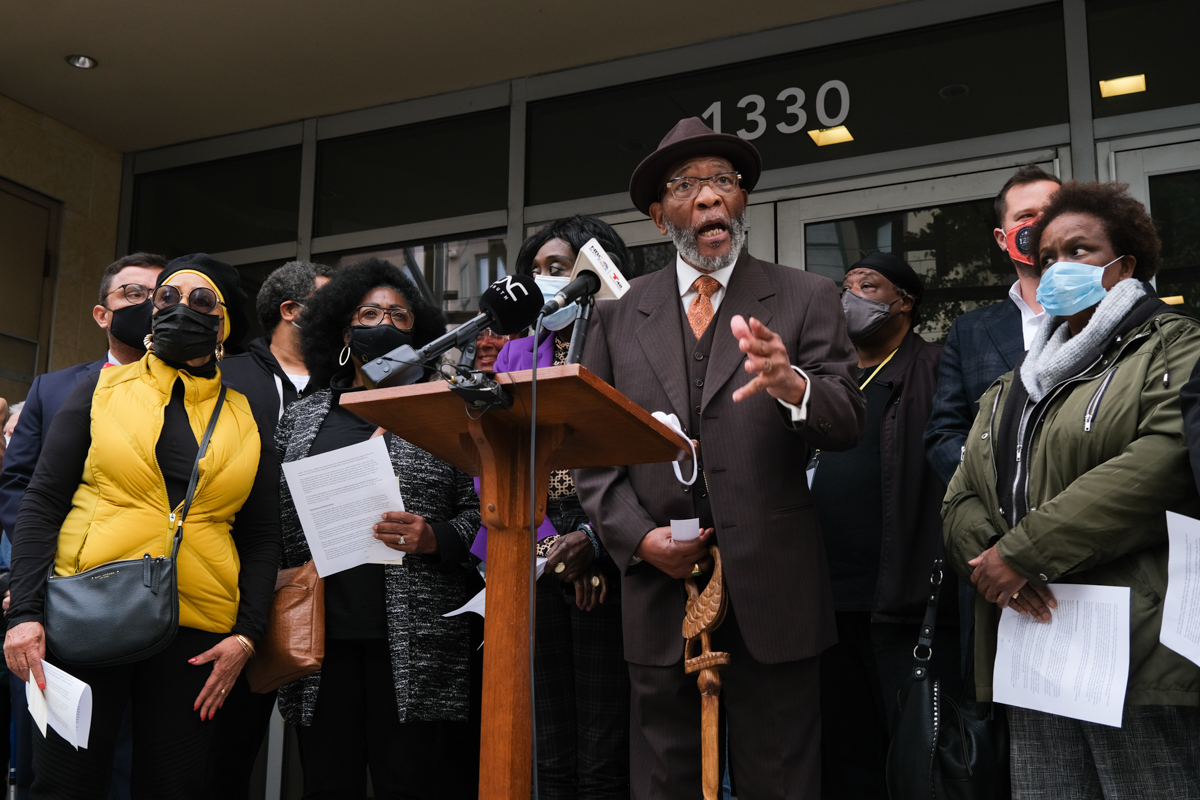At a meeting Monday night at San Francisco’s Third Baptist Church, Rev. Amos Brown and other Black community leaders called on the city to fix what they described as an escalating homelessness and drug problem. These issues, they said, disproportionately hurt the historically Black Fillmore District, an already vulnerable community.
Several dozen people attended the meeting, with its tone alternating between desperation and anger. Speaker after speaker sounded the same note, calling for an increased police presence. Further, they want to require homeless drug addicts to get treatment and prevent them from camping on the street.
“My grandma used to say, ‘Your freedom ends where my nose begins,’” said Brown, who is also president of the San Francisco branch of the NAACP and a former local politician. “When homeless folks cause problems, their freedom ends. That’s not being mean, it’s being what I call engaging in responsible compassion.”
Community members said the parking lot of the Fillmore District’s Safeway is ground zero, and that Safeway was turning a blind eye to the problems. They cited cars blasting music, human feces everywhere, harassment from drug dealers, syringes in planters and having to witness “X-rated acts.” With Rosa Parks Elementary School a block away, they worry that this sets the wrong example for children and that the community will be adversely affected for years.
“We peeped in the tents, and they weren’t sleeping—they were doing drugs,” Brown said.
Several people present at Monday night’s meeting agreed. One community member reported leaving the Safeway, his hands full of grocery bags, when he saw a young man “almost getting bitten to death by a pit bull.” It took police 27 minutes to respond, said neighbor Daniel Landry.
In July, the executive director of a Fillmore District nonprofit confronted two men who looked like they were doing drugs in his nonprofit’s parking lot. He ended up getting beaten with a wooden 2-by-4.
In yet another Fillmore District incident this year, the janitor at the Third Baptist Church had to chase away drug users who had climbed onto the roof. Brown, the church’s reverend, said a white homelessness advocate asked them to be more compassionate.
“We are not about reckless compassion,” he said. “How’s she speaking up for the homeless when 40% of homeless people are Black? That’s disrespectful. We end up being the ones who are suffering.”
A Safeway representative who called in said the grocery company is committed to doing more. There are 33 “no loitering” signs in the parking lot, he said. In addition, Safeway has been “steam cleaning” the parking lot and paying for a service that tracks cars parked for over 90 minutes.
Community members were skeptical.
“Drug dealers aren’t worried about signs, OK?” one speaker noted. “We need roving security to make sure that the children and the elderly can shop without being harassed and accosted.”
San Francisco city representatives said they were taking the issue seriously.
“Fentanyl has really changed the game in so many ways,” said Shireen McSpadden, executive director of San Francisco’s Department of Homelessness and Supportive Housing.
Barely a month after the most recent gun-related killing in the Fillmore, some community members said more police presence was the most important thing.
“Just the police’s presence will make a difference,” said Majeid Crawford, executive director of the New Community Leadership Foundation. “Their eyes will prevent crime from happening.”
And they want the Fillmore District to be treated equally.
“If they can clean up Pac Heights, we feel like they can do the same thing in the Fillmore,” Brown said, referring to the whiter and considerably more affluent neighborhood immediately to the north. “We’re saying we need to be respected, and we need for our communities to have their fair share of enforcement. That’s it.”
Correction: A previous version of this article incorrectly attributed a quote to Majeid Crawford, executive director of the New Community Leadership Foundation.
